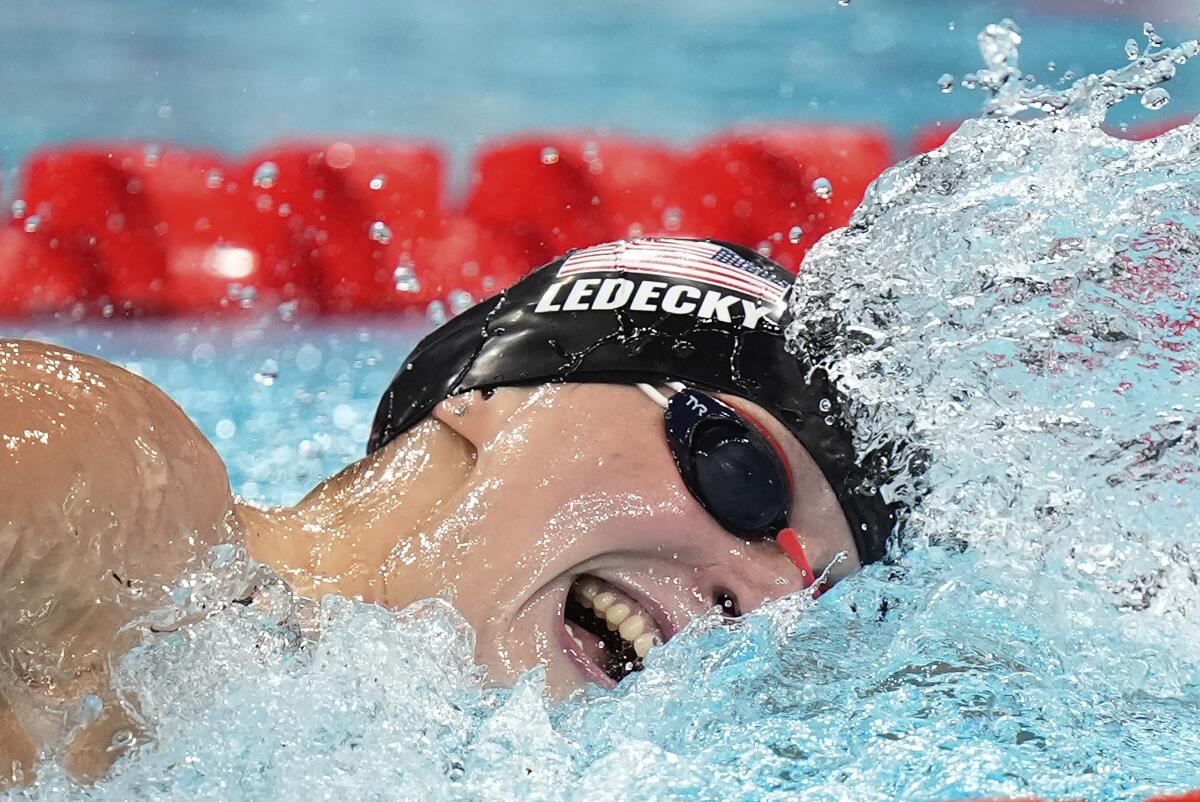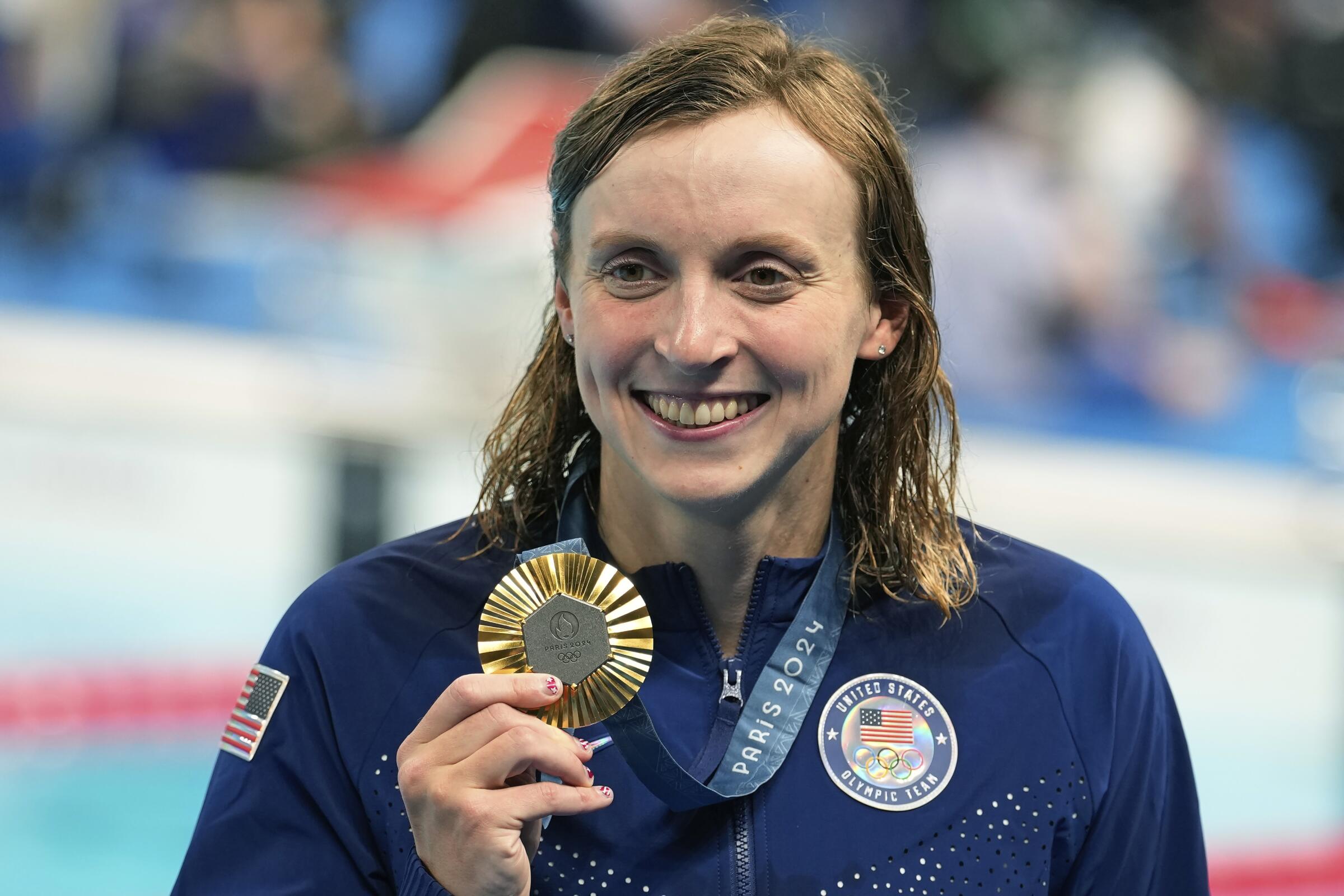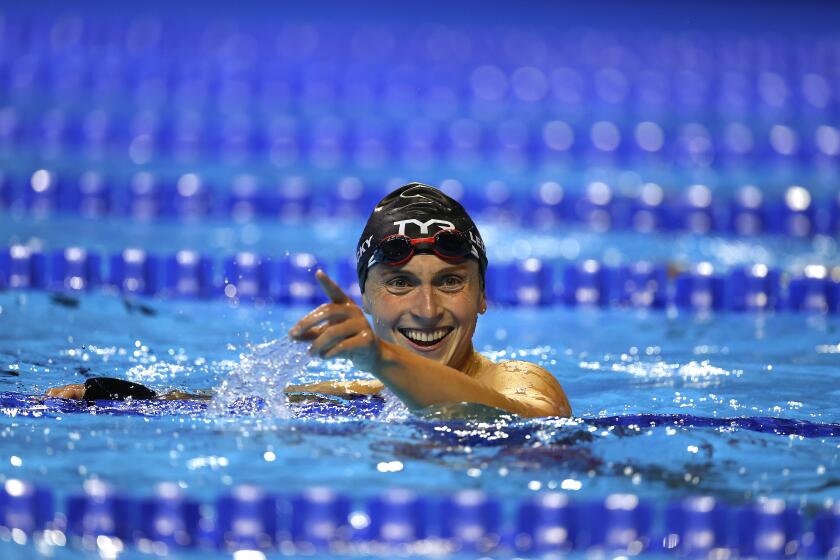Kevin Baxter writes about soccer and hockey for the Los Angeles Times. He has covered seven World Cups, five Olympic Games, six World Series and a Super Bowl and has contributed to three Pulitzer Prize-winning series at The Times and Miami Herald. An essay he wrote in fifth grade was voted best in the class. He has a cool dog.
- Share via
1
NANTERRE, France — There are no superlatives left to accurately describe Katie Ledecky’s brilliance.
She’s Gretzky in a latex bathing cap; Michael Jordan in goggles.
Her victory Saturday in the women’s 800-meter freestyle at La Defense Arena in suburban Paris brought her a 14th Olympic swimming medal and a ninth Olympic title. Only Michael Phelps has more of either, making Ledecky the most decorated female swimmer in Olympic history.
But she’s also human. So the first emotion she remembers feeling after touching the wall was relief.
“Coming into the 800 I felt a lot of pressure, from myself, from my history in the race,” she said. “I knew going into it that it was going to be a really tough race, and that everyone in the field was going to throw everything they had at me. I think we were all hurting after that one.”
Ledecky had to work harder than usual for the win, her fourth straight in the event, holding off a late charge from Australian Ariarne Titmus to win in 8 minutes 11.04 seconds. Titmus finished in 8:12.29 with Paige Madden third in 8:13.00, a time that made her the second-fastest American and fourth-fasted performer all time in the event, highlighting a nine-day Olympic swim meet that has been historically bad for the rest of the U.S. team.

American Katie Ledecky competes in the women’s 800-meter freestyle final at the Summer Olympics on Saturday.
(Brynn Anderson / Associated Press)
“After the race, I just pulled Ariarne aside and [said,] ‘Thank you for making me better,’” Ledecky said. “We bring the best out of each other. And knowing that you have to step up and race somebody like her at these meets definitely pushes you in training every day.”
Inspiring her competitors to raise their performance may ultimately prove to be the greatest legacy for Ledecky, who won her first Olympic 800 in 2012 when she was 15.
“I was 11 years old when she won her gold in London. I was in grade six in primary school,” said Titmus, 23, drawing a wry grin from Ledecky who is just four years older. “That’s just remarkable, to think that she’s still winning at this level. I just have the most incredible respect for her.
“I know how hard it is to defend the title and to go for four in a row is unreal. I’m happy that she was the one to beat me to keep her streak alive.”
Added Madden: “To be honest, I never really consider myself as chasing her. If I get second to her, in my heart I’ve won.”
Katie Ledecky’s seemingly effortless excellence leaves some of the most experienced people in swimming grasping for the secret to her dominance
During the medal ceremony, Ledecky invited her teammate to stand next to her on the top step of the platform during the national anthem, which they sang together.
“So amazing,” Madden said. “That was one of the best moments of my life. It’s also a testament to Katie’s character. I’ll be so thankful that she did that forever.”
And Ledecky’s greatness isn’t just limited to swimming. Only two other female athletes in any sport have more Olympic medals than Ledecky — Soviet gymnast Larisa Latynina with 18 and Norwegian Marit Bjorgen, a cross-country skier, with 15. She’ll leave Paris having won medals in all four of her races she swam.
The rest of the U.S. team hasn’t done nearly as well.
In addition to the two medals in the women’s 800 free, the Americans got a silver from Kate Douglass in the women’s 200 individual medley and a gold in the mixed 400 medley relay — where the U.S. quartet of Ryan Murphy, Nic Finke, Gretchen Walsh and Torri Huske — broke the world record. That left the U.S. with 25 swimming medals in Paris, six of which have been gold.
Trinity Rodman scores in extra time as the United States escapes with a 1-0 victory over Japan to advance to the Paris Olympic semifinals.
(Alex Walsh finished third behind Douglass in the 200 IM but lost her bronze after being disqualified for an illegal back-to-breast turn.)
With just two individuals — Gretchen Walsh in the women’s 50 freestyle and Bobby Finke in the men’s 1,500 — and two relay teams competing on the final day of swimming Sunday, the best the Americans can do is 29.
It’s been two decades since the U.S. won fewer than 30.
The six golds, meanwhile, are the fewest since 1956, when the Americans won two. And all the golds in men’s events have come in relays, so if Bobby Finke fails to win the 1,500, it will mark the first Olympics since 1900 in which no U.S. male swimmer won an individual event.
As for Ledecky, whether Saturday’s race is the end of that road for her after four Olympics, she’s refused to say. But she has called the opportunity to swim at home in Los Angeles in 2028 something that not every Olympic athlete gets. So she might just stick around for that, perhaps inspiring other Australian schoolgirls like Titmus.
“I’d love to, but it’s not easy,” she said Saturday. “I’ll take it year by year, and give it everything I’ve got for as long as I have left in me.”







